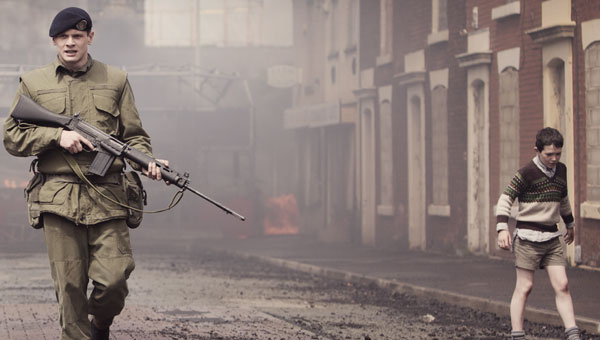’71 Review

1971, two years into the Troubles, was a turbulent year for Northern Ireland. And that’s putting it lightly.
There was the Ballymurphy Massacre in August, and the bombing of McGurk’s bar in December, along with countless riots and killings on both sides.
This is the incendiary setting which forms the backdrop for Yann Demange’s feature film directorial debut, ’71.
The story revolves around new army recruit Gary Hook and his deployment to Belfast. He is keen to follow orders but noticeably feels unsettled about the mission.
A thick, ominous air hangs around him, especially as he sails across the Irish Sea contemplating his commanding officer’s words of reassurance that he would ‘still be in the same country’.
Upon arrival and orientation in Belfast, Hook and his fellow soldiers are swiftly dispatched on a house search mission in the heart of Catholic Belfast. Public disruption ensues as the soldiers are confronted by angry residents.
In the chaos, Hook is separated from his unit and accidentally abandoned. He finds himself shot at and chased through the streets, forced into hiding and unaware of who he can trust.
Contrary to his commanding officer’s words, Hook finds himself in a very different country altogether.
The film starts off well, shaping up as an atmospheric and dark odyssey into the heart of the Troubles, reminiscent of films like Apocalypse Now. Hook is very much a character who is carried by the story, rather than vice versa.
But rather than being as rich and deep a depiction of a real-life setting and era as, say, Steve McQueen’s Hunger, the film descends into a genre thriller punctuated by frenetic shootouts and distracting cat-and-mouse shenanigans.
It’s as if the first half of the film was directed by Shane Meadows, and the second half by Quentin Tarantino.
The film does succeed on other fronts.
It succeeds in conveying the sheer mindlessness of war in a non-clichéd way, and it manages to evenly handle sympathies towards both sides of the conflict. The Nationalists are depicted in even measures as savage but compassionate, whilst the English and Unionists are shown to be both well-meaning and heartlessly calculating.
Some of the characters are admittedly not incredibly well drawn, and some of the promising ones are swiftly jettisoned. And alarm bells are loud with the first suggestion of a romance between Hook and a girl who helps him.
But the film has a decent main cast going for it, featuring Jack O’Connell on reliably
solid form as Hook, with David Wilmot and Sean Harris providing solid support as the would-be leaders on both sides.
The cast is then rounded out by several performers from Irish TV series Love/Hate.
Tat Radcliffe’s cinematography is evocative of Hook’s disorientation and a despair-filled, sparse soundtrack is provided by the excellent David Holmes.
In all, a solid film, with strong performances, though the story doesn’t quite delve into the subject matter as deep as you would hope.
Jonathan Campbell